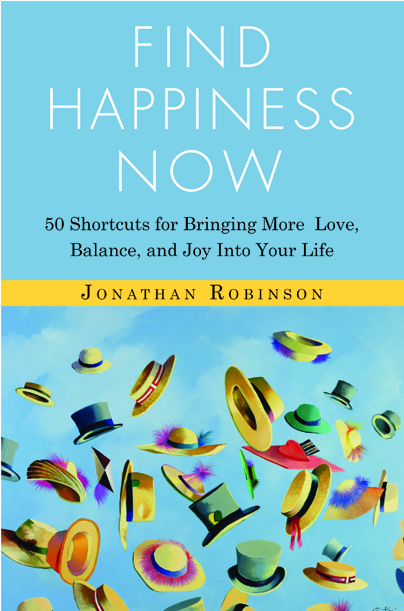 You are living in a dangerous cult. I mean it. Of course, like most people in cults, you don’t think it’s dangerous—or that it’s even a cult. This “cult” that you (and I) are living in is the hyper capitalist economic system of modern day life.
You are living in a dangerous cult. I mean it. Of course, like most people in cults, you don’t think it’s dangerous—or that it’s even a cult. This “cult” that you (and I) are living in is the hyper capitalist economic system of modern day life.
In this cult or cult-ure we’re part of, we’re hypnotized to believe certain things that are not really true. For example, we’re conditioned to believe that if only we had more money, or the right relationship or less wrinkles—THEN we’d be a lot happier. Studies prove that these ideas aren’t actually true, but we eventually start to believe them because we’re constantly bombarded with such messages.
Here’s a question that can determine if you’ve truly been indoctrinated into the capitalist cult. Which of these two options do you think would make you happier? Option one: winning over a million dollars in the lottery. Option two: becoming paralyzed from the waist down. Which do you think would lead you to being happier after a year of time has passed?
If you think the obvious answer is winning the lottery, you’re wrong. It means you’ve bought our cult’s basic dogma—that what happens to you determines your level of happiness. Although such a notion is widespread and unquestioned in Western culture, scientific research does not bear this idea out. People who are paralyzed and people who win the lottery are equally happy after a year of time has passed.
In the search for  happiness that we are all on, you can’t assume anything that you’ve heard. Unfortunately, our culture is constantly pushing its ideas about finding the “good life” onto us, and that brainwashing does not necessarily have anything to do with being happy. After all, does Donald Trump look joyous to you? In the last twenty years, the average GDP of Chinese citizens has gone up 400%, and yet their average level of happiness has actually gone down.
happiness that we are all on, you can’t assume anything that you’ve heard. Unfortunately, our culture is constantly pushing its ideas about finding the “good life” onto us, and that brainwashing does not necessarily have anything to do with being happy. After all, does Donald Trump look joyous to you? In the last twenty years, the average GDP of Chinese citizens has gone up 400%, and yet their average level of happiness has actually gone down.
In our culture, we’ve also been led to believe that having a lot of choice is a good thing. There are over 24,000 items to choose from just in your local supermarket. With the Internet, our range of choices has become virtually infinite. The problem is we’ve been led to assume that the more choices we have, the richer and more satisfying our lives will become. Yet, numerous studies show that our gluttony of choice mostly just adds to our level of stress–and makes us less contended with our lives.
In fact, contrary to cult doctrine, having a lot of money, good health, or a job you enjoy doesn’t truly lead to happiness. Rather, research shows that we have it completely backwards. Numerous studies indicate that it is being a happy person that leads to having more money, good health and a job you enjoy. Highly fulfilled people end up making over $750,000 more during their lifetime than people who are unhappy. Highly contented people also live an average of 8 years longer than the rest of us, and have half the level of divorce.
If the specifics of our lives (money, health, job, choice) don’t determine our level of happiness, what does? Researchers have identified several factors. First, part of our happiness is determined by our genetics. Unfortunately, there’s nothing we can do about that. Yet, much of our level of well-being is due to our attitude, our focus on relationships, and certain beliefs and behaviors that happy people tend to have. Fortunately, many of these attitudes and behaviors can be easily learned.
 Here’s just one example. Highly contented people tend to schedule time each week for activities they truly enjoy. On the other hand, unhappy people tend to make excuses as to why they don’t have time for what they really like to do. Here’s another example. Happy people make being with friends and enjoying life a central priority in their life, whereas less contented folks make things like making money their main priority.
Here’s just one example. Highly contented people tend to schedule time each week for activities they truly enjoy. On the other hand, unhappy people tend to make excuses as to why they don’t have time for what they really like to do. Here’s another example. Happy people make being with friends and enjoying life a central priority in their life, whereas less contented folks make things like making money their main priority.
Here’s the problem. How do you become a happy person while living in a cult (culture) that does not value what really leads to happiness? It’s hard. It requires going against the grain of what the people around you are doing. It means you need to ignore the 500 or so advertising messages you get each day, and instead listen to the still, small voice inside. In fact, that’s what happy people do a lot. They spend quiet time in nature. They surround themselves with people, books, and ideas that nurture their dream of a joyful, caring, and deeply fulfilling life.
Like you, I was conditioned to think that certain things would make me happy. For better or worse, I got many of those things at an early age. I got rich. I wrote books that got me on Oprah and other national shows on numerous occasions. Instead of feeling a sense of accomplishment, I felt like I always had to do something bigger and better in the future. I was not a happy camper. There was only one way out—and that was “in.” As I studied the research on happiness, I learned that everything I’d been taught about how to be happy was basically not true.
It turns out  that the American Dream is actually a repetitive, busy, and not too unpleasant nightmare. I soon realized that always striving for more, always being busy, and constantly competing for recognition was not a path to greater peace of mind. As I began to see through the brainwashing of Western culture, I began to notice what really made me happy. What really made me happy wasn’t having bouncy hair, a big house, or a Mercedes. It ends up it was little moments of depth and joy I could find in everyday life. Nowadays, I spend more time playing with my dog, watching sunsets, hanging out with my friends, reading great books, and meditating.
that the American Dream is actually a repetitive, busy, and not too unpleasant nightmare. I soon realized that always striving for more, always being busy, and constantly competing for recognition was not a path to greater peace of mind. As I began to see through the brainwashing of Western culture, I began to notice what really made me happy. What really made me happy wasn’t having bouncy hair, a big house, or a Mercedes. It ends up it was little moments of depth and joy I could find in everyday life. Nowadays, I spend more time playing with my dog, watching sunsets, hanging out with my friends, reading great books, and meditating.
So your mission, should you decide to accept it, is to find out what actually makes you uniquely happy. Assume you’ve been in a dangerous cult and you need to get free of its programming. Ask questions, explore new ideas, and notice when your actual experience does not match up with beliefs and behaviors that have been forced on you from the cult we’re in. To help show you the way, there is a certain group of people who tend to be very happy a lot of the time. This “group of people” are kids under the age of six. What do they do differently than adults? They play more, they plan less, and they explore the present moment fully and completely. That’s a good place to start on the ever-evolving road to happiness.
 What do you want in life? You may think it’s money, or a hot relationship or a better job, but why do you want those things? Because you think if you had them, you’d be even happier. I call this belief the “as soon as” method for finding happiness. You think “As soon as I have more money, or as soon as I lose 10 pounds, or as soon as I find my soul mate, THEN I will be happy.” I have good news and bad news for you. First, the bad news: if you are a member of the “as soon as” approach to finding happiness, you’ll never be happy for long.
What do you want in life? You may think it’s money, or a hot relationship or a better job, but why do you want those things? Because you think if you had them, you’d be even happier. I call this belief the “as soon as” method for finding happiness. You think “As soon as I have more money, or as soon as I lose 10 pounds, or as soon as I find my soul mate, THEN I will be happy.” I have good news and bad news for you. First, the bad news: if you are a member of the “as soon as” approach to finding happiness, you’ll never be happy for long.

 Why do people travel half way around the world to visit a place such as Disneyland, pay $125 to get in, and stand in line for an hour for a three minute ride? Because, as human beings, we crave peak moments. The desire for an intense, special, extraordinary experience is one of our deepest desires. That’s one of the major reasons why we like sex, falling in love, winning a big game, and weddings. Yet, peak moments need not be reserved for such major events. You can learn to create them in daily life with people you care about. Once you learn the skill of creating special times for other people, your relationships will never be the same. People will want to know you, do business with you, and even marry you because you know how to create a sense of aliveness wherever you are. There are four key concepts that can help you create more peak moments with your friends, mate,
Why do people travel half way around the world to visit a place such as Disneyland, pay $125 to get in, and stand in line for an hour for a three minute ride? Because, as human beings, we crave peak moments. The desire for an intense, special, extraordinary experience is one of our deepest desires. That’s one of the major reasons why we like sex, falling in love, winning a big game, and weddings. Yet, peak moments need not be reserved for such major events. You can learn to create them in daily life with people you care about. Once you learn the skill of creating special times for other people, your relationships will never be the same. People will want to know you, do business with you, and even marry you because you know how to create a sense of aliveness wherever you are. There are four key concepts that can help you create more peak moments with your friends, mate,  With Thanksgiving upon us, I thought it was a good idea to blog about giving thanks and the power of gratitude. In my book
With Thanksgiving upon us, I thought it was a good idea to blog about giving thanks and the power of gratitude. In my book  From Bear’s inspiration and the wisdom of many others
From Bear’s inspiration and the wisdom of many others Once you have used this method for awhile, you can even use it to begin to value things that are unpleasant. In the example above, getting cut off by an aggressive driver was not my idea of a good time. Yet, if I’m doing my “thank you” mantra, I’m more likely to see how such an event can serve me. From a higher state of mind, I can see that this driver is helping me learn patience, compassion, and forgiveness—three things I’m not very good at. Fortunately, there are many drivers and people who are willing to help me learn this lesson! Thank you God for all that help.
Once you have used this method for awhile, you can even use it to begin to value things that are unpleasant. In the example above, getting cut off by an aggressive driver was not my idea of a good time. Yet, if I’m doing my “thank you” mantra, I’m more likely to see how such an event can serve me. From a higher state of mind, I can see that this driver is helping me learn patience, compassion, and forgiveness—three things I’m not very good at. Fortunately, there are many drivers and people who are willing to help me learn this lesson! Thank you God for all that help. As a psychotherapist, I often counsel couples who frequently argue. Early in my career, I tried to help these people with communication techniques aimed at helping them be more open with each other. Yet, it rarely worked. They would simply forget the method and continue with their verbal attacks. When I realized couples behave like hurt infants when they get into a fight, I asked myself, “What helps crying infants to feel better?” The answer was obvious–they like to be held. As parents gently hold their baby, the baby soon feels better. Before you know it, the infant is giggling and happy. I wondered if a similar approach might work with adults. After much trial and error, I found something that works even better than I expected. I call it “The Spoon Tune.”
As a psychotherapist, I often counsel couples who frequently argue. Early in my career, I tried to help these people with communication techniques aimed at helping them be more open with each other. Yet, it rarely worked. They would simply forget the method and continue with their verbal attacks. When I realized couples behave like hurt infants when they get into a fight, I asked myself, “What helps crying infants to feel better?” The answer was obvious–they like to be held. As parents gently hold their baby, the baby soon feels better. Before you know it, the infant is giggling and happy. I wondered if a similar approach might work with adults. After much trial and error, I found something that works even better than I expected. I call it “The Spoon Tune.” while in a spooning position, breathe in unison with your mate. Generally, it is best for the bigger partner to follow the breath of the smaller partner. When the smaller person inhales, the other partner should inhale. When the smaller partner exhales, the other should exhale. Hold each other and breathe in unison like this for at least four minutes. Do not say anything. As soon as your mind wanders, focus once again on breathing in unison with your partner.
while in a spooning position, breathe in unison with your mate. Generally, it is best for the bigger partner to follow the breath of the smaller partner. When the smaller person inhales, the other partner should inhale. When the smaller partner exhales, the other should exhale. Hold each other and breathe in unison like this for at least four minutes. Do not say anything. As soon as your mind wanders, focus once again on breathing in unison with your partner. Once you begin the Spoon Tune, no talking allowed. If possible, find a place to lie down together. If that is not possible “spoon” standing up. The key to doing this method successfully is to breathe together. As you breathe together, try to focus on and be present with each breath. Use your breath as a meditation. By focusing on your breath as it goes in and out in rhythm with your partner’s breath, you will feel more peaceful, safe, and connected, spoon for at least three minutes.
Once you begin the Spoon Tune, no talking allowed. If possible, find a place to lie down together. If that is not possible “spoon” standing up. The key to doing this method successfully is to breathe together. As you breathe together, try to focus on and be present with each breath. Use your breath as a meditation. By focusing on your breath as it goes in and out in rhythm with your partner’s breath, you will feel more peaceful, safe, and connected, spoon for at least three minutes. I recently took an online course called “Awakening Joy.” It was quite good, maybe even as good as my own online course called “
I recently took an online course called “Awakening Joy.” It was quite good, maybe even as good as my own online course called “ For example, today I was playing with my dog and we were both having a great time. Then, when she was done with playing, she came over to cuddle with me in my lap. We cuddled for a moment, and I enjoyed the feeling of petting her and feeling my deep love for her. Then after a minute, I had the thought, “What do I need to do next?” Of course, my “list” is never done, so there were plenty of things to do, but why did I need to curtail such a sweet moment so quickly? In fact, I did not have to, but I realized I have been trained by our culture to always be productive—even at the expense of hanging out with more moments of love, intimacy, and joy. Can you relate to this?
For example, today I was playing with my dog and we were both having a great time. Then, when she was done with playing, she came over to cuddle with me in my lap. We cuddled for a moment, and I enjoyed the feeling of petting her and feeling my deep love for her. Then after a minute, I had the thought, “What do I need to do next?” Of course, my “list” is never done, so there were plenty of things to do, but why did I need to curtail such a sweet moment so quickly? In fact, I did not have to, but I realized I have been trained by our culture to always be productive—even at the expense of hanging out with more moments of love, intimacy, and joy. Can you relate to this? So having seen my own tendency to start thinking of my “to do” list in the midst of positive emotions, I have taken steps to go against it. Nowadays, when I see that I am curtailing a sweet and/or intimate moment, I try instead to stay with my positive experience. I take a deep breath and remind myself; nothing is more important than joyful moments. I attempt to “hang out” with such feelings until they naturally drift away.
So having seen my own tendency to start thinking of my “to do” list in the midst of positive emotions, I have taken steps to go against it. Nowadays, when I see that I am curtailing a sweet and/or intimate moment, I try instead to stay with my positive experience. I take a deep breath and remind myself; nothing is more important than joyful moments. I attempt to “hang out” with such feelings until they naturally drift away. In the movie Snow White, the queen asks her mirror who is the “fairest one of all.” The mirror breaks the bad news to her that there is someone much more beautiful than she. Like the queen, most of us have bought the idea that we are not as beautiful, worthy of love, or as good as someone else. Capitalizing on our insecurities and lack of self-worth, advertisers tell us that if we were only richer or more beautiful, we’d be loved. Although we may know better in theory, it’s easy to fall into the trap of trying to gain recognition from others as a substitute for our lack of self-love. Yet, there is no substitute for really liking yourself. Even if the whole world applauds you, if you don’t feel good about yourself, it doesn’t matter. Unfortunately, the sad truth is that most people don’t feel good about themselves. Therefore, what’s needed is a practical and powerful way to grow our sense of self-worth. Fortunately, there is a method that can greatly nurture and enhance a person’s sense of self esteem. I call it the Mirror Exercise (ME).
In the movie Snow White, the queen asks her mirror who is the “fairest one of all.” The mirror breaks the bad news to her that there is someone much more beautiful than she. Like the queen, most of us have bought the idea that we are not as beautiful, worthy of love, or as good as someone else. Capitalizing on our insecurities and lack of self-worth, advertisers tell us that if we were only richer or more beautiful, we’d be loved. Although we may know better in theory, it’s easy to fall into the trap of trying to gain recognition from others as a substitute for our lack of self-love. Yet, there is no substitute for really liking yourself. Even if the whole world applauds you, if you don’t feel good about yourself, it doesn’t matter. Unfortunately, the sad truth is that most people don’t feel good about themselves. Therefore, what’s needed is a practical and powerful way to grow our sense of self-worth. Fortunately, there is a method that can greatly nurture and enhance a person’s sense of self esteem. I call it the Mirror Exercise (ME). feeling pretty stressed lately, haven’t you? Well, you’ve been busy helping a lot of people. You need to remember to take care of yourself. You deserve it. You’ve worked hard. It’s amazing all the tasks you do. I’m proud of the fact that you’ve become a very giving person over the years. I appreciate how you’re really committed to helping others. I like you. You’re often a lot of fun to be with. Some of the stories you said last night at the party were really funny. I appreciate your sense of humor. You don’t have to try so hard to be liked—because you are liked. Not for what you do, but for who you are. I want you to know that you’re doing just fine. Allow yourself to relax more and just receive all the goodwill people feel towards you. I respect who you are, and I want you to know I love you.”
feeling pretty stressed lately, haven’t you? Well, you’ve been busy helping a lot of people. You need to remember to take care of yourself. You deserve it. You’ve worked hard. It’s amazing all the tasks you do. I’m proud of the fact that you’ve become a very giving person over the years. I appreciate how you’re really committed to helping others. I like you. You’re often a lot of fun to be with. Some of the stories you said last night at the party were really funny. I appreciate your sense of humor. You don’t have to try so hard to be liked—because you are liked. Not for what you do, but for who you are. I want you to know that you’re doing just fine. Allow yourself to relax more and just receive all the goodwill people feel towards you. I respect who you are, and I want you to know I love you.” For example, you may try to do this exercise completely naked in front of a full-length mirror. Most people are at war with their bodies, but the ME can help. By starting with specific parts of your body that you like, you can eventually get to accept every part of your anatomy. During this form of the Mirror Exercise, talk to the various parts of your body and try to develop a better relationship with them. For example, you might say, “Hello nose. As you know, you’re bigger than I would like you to be, but I am grateful for all the wonderful smells you send my way. I’m going to try to appreciate you more. You really do a great job. Thank you for adding to my life.”
For example, you may try to do this exercise completely naked in front of a full-length mirror. Most people are at war with their bodies, but the ME can help. By starting with specific parts of your body that you like, you can eventually get to accept every part of your anatomy. During this form of the Mirror Exercise, talk to the various parts of your body and try to develop a better relationship with them. For example, you might say, “Hello nose. As you know, you’re bigger than I would like you to be, but I am grateful for all the wonderful smells you send my way. I’m going to try to appreciate you more. You really do a great job. Thank you for adding to my life.”
 I used to suffer greatly from a bad case of self-criticism, in my teenage years, it was so severe that I could never ask a girl out on a date. I feared that she’d say “no” and I’d end up spending the next week getting down on myself for my failure.
I used to suffer greatly from a bad case of self-criticism, in my teenage years, it was so severe that I could never ask a girl out on a date. I feared that she’d say “no” and I’d end up spending the next week getting down on myself for my failure. What would it be like if you found out that you had a million dollars in a secret bank account, but you didn’t know it? Wouldn’t that be great? Well, in a certain way you do. You have enormous riches locked within you in the form of positive feelings—such as love, gratitude, compassion, and joy. The problem is, most people haven’t known how to access these feelings. Yet, the new field of
What would it be like if you found out that you had a million dollars in a secret bank account, but you didn’t know it? Wouldn’t that be great? Well, in a certain way you do. You have enormous riches locked within you in the form of positive feelings—such as love, gratitude, compassion, and joy. The problem is, most people haven’t known how to access these feelings. Yet, the new field of  I sell (for very little money I might add), a systematic course in teaching people the best and most powerful ways to quickly boost their level of happiness. There are over 30 methods in my Deeper Happiness course that have been shown to boost people’s level of happiness, and most of them take under three minutes a day to do. That’s great news. It’s like learning you had a million dollars lying around in the bank, but you didn’t know it.
I sell (for very little money I might add), a systematic course in teaching people the best and most powerful ways to quickly boost their level of happiness. There are over 30 methods in my Deeper Happiness course that have been shown to boost people’s level of happiness, and most of them take under three minutes a day to do. That’s great news. It’s like learning you had a million dollars lying around in the bank, but you didn’t know it. Although such books contain valuable information, virtually no one uses what they read from books in a systematic manner in their daily life. It’s just too big of a jump. What’s needed is a simple, almost automatic way to be reminded to use Positive Psychology exercises in daily life.
Although such books contain valuable information, virtually no one uses what they read from books in a systematic manner in their daily life. It’s just too big of a jump. What’s needed is a simple, almost automatic way to be reminded to use Positive Psychology exercises in daily life. You are living in a dangerous cult. I mean it. Of course, like most people in cults, you don’t think it’s dangerous—or that it’s even a cult. This “cult” that you (and I) are living in is the hyper capitalist economic system of modern day life.
You are living in a dangerous cult. I mean it. Of course, like most people in cults, you don’t think it’s dangerous—or that it’s even a cult. This “cult” that you (and I) are living in is the hyper capitalist economic system of modern day life. happiness that we are all on, you can’t assume anything that you’ve heard. Unfortunately, our culture is constantly pushing its ideas about finding the “good life” onto us, and that brainwashing does not necessarily have anything to do with being happy. After all, does Donald Trump look joyous to you? In the last twenty years, the average GDP of Chinese citizens has gone up 400%, and yet their average level of happiness has actually gone down.
happiness that we are all on, you can’t assume anything that you’ve heard. Unfortunately, our culture is constantly pushing its ideas about finding the “good life” onto us, and that brainwashing does not necessarily have anything to do with being happy. After all, does Donald Trump look joyous to you? In the last twenty years, the average GDP of Chinese citizens has gone up 400%, and yet their average level of happiness has actually gone down. Here’s just one example. Highly contented people tend to schedule time each week for activities they truly enjoy. On the other hand, unhappy people tend to make excuses as to why they don’t have time for what they really like to do. Here’s another example. Happy people make being with friends and enjoying life a central priority in their life, whereas less contented folks make things like making money their main priority.
Here’s just one example. Highly contented people tend to schedule time each week for activities they truly enjoy. On the other hand, unhappy people tend to make excuses as to why they don’t have time for what they really like to do. Here’s another example. Happy people make being with friends and enjoying life a central priority in their life, whereas less contented folks make things like making money their main priority. that the American Dream is actually a repetitive, busy, and not too unpleasant nightmare. I soon realized that always striving for more, always being busy, and constantly competing for recognition was not a path to greater peace of mind. As I began to see through the brainwashing of Western culture, I began to notice what really made me happy. What really made me happy wasn’t having bouncy hair, a big house, or a Mercedes. It ends up it was little moments of depth and joy I could find in everyday life. Nowadays, I spend more time playing with my dog, watching sunsets, hanging out with my friends, reading great books, and meditating.
that the American Dream is actually a repetitive, busy, and not too unpleasant nightmare. I soon realized that always striving for more, always being busy, and constantly competing for recognition was not a path to greater peace of mind. As I began to see through the brainwashing of Western culture, I began to notice what really made me happy. What really made me happy wasn’t having bouncy hair, a big house, or a Mercedes. It ends up it was little moments of depth and joy I could find in everyday life. Nowadays, I spend more time playing with my dog, watching sunsets, hanging out with my friends, reading great books, and meditating.